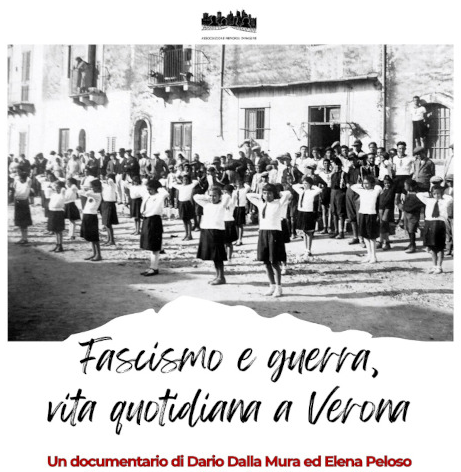
FASCISMO E GUERRA, LA VITA QUOTIDIANA A VERONA
Attraverso le testimonianze dirette di alcuni ragazzi e ragazze che vissero quei tempi, il documentario racconta la vita quotidiana a scuola in famiglia a Verona durante il fascismo. Inoltre è rievocato l’arrivo della guerra, con i bombardamenti, i razionamenti e finalmente la liberazione e l’entusiasmo per la ritrovata libertà.
GIOVANNI LONGHETTO, POST FATA RESURGO. UN QUADRO, UN ENIGMA
Il documentario analizza un quadro di Giovanni Longhetto, pittore e ex deportato a Buchenwald, che lo terminò nel 1948 e che si trova all’ istituto “Lorgna Pindemonte” di Verona. Attraverso varie testimonianze si indagano i misteri legati al significato dei numerosi personaggi presenti nell’ opera dove, tra figure allegoriche, compare al centro un preside fascista e nell’angolo in basso a destra un deportato con la divisa e il numero dello stesso Longhetto.La lettura del quadro è quindi anche il tentativo di fare luce sulla complessità del secondo dopoguerra,che rimane tuttavia una vicenda enigmatica.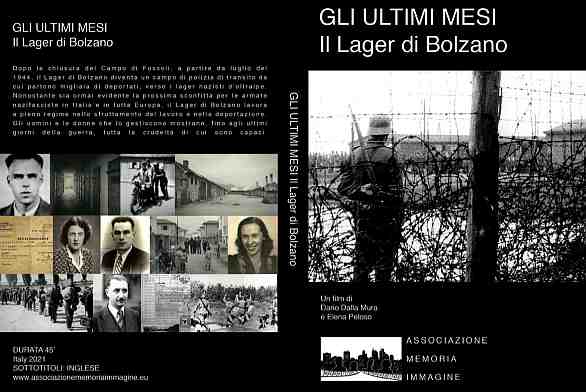
GLI ULTIMI MESI - Il lager di Bolzano
Dopo la chiusura del Campo di Fossoli, a partire da luglio del 1944, il Lager di Bolzano diventa un campo di polizia di transito da cui partono migliaia di deportati, verso i lager nazisti d’oltralpe. Nonostante sia ormai evidente la prossima sconfitta per le armate nazifasciste in Italia e in tutta Europa, il Lager di Bolzano lavora a pieno regime nello sfruttamento del lavoro e nella deportazione. Gli uomini e le donne che lo gestiscono mostrano, fino agli ultimi giorni della guerra, tutta la crudeltà di cui sono capaci. (45', Italia, 2021)After the closure of the Fossoli Camp, starting from July 1944, the Bolzano Lager became a transit police camp from which thousands of deportees left for the Nazi concentration camps across the Alps. Despite the fact that the next defeat for the Nazi-Fascist armies in Italy and throughout Europe is now evident, the Bolzano Lager works at full capacity in the exploitation of labor and deportation. The men and women who run it show, until the last days of the war, all the cruelty of which they are capable. (45', Italy, 2021)

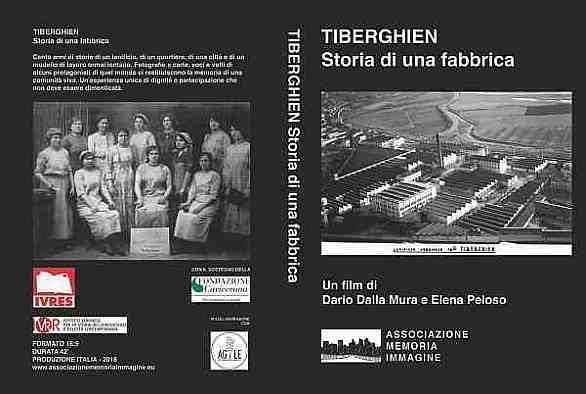
TIBERGHIEN - Storia di una fabbrica
Cento anni di storia di un lanificio, di un quartiere, di una città e di un modello di lavoro ormai lontano. Fotografie e carte, voci e volti di alcuni protagonisti di quel mondo ci restituiscono la memoria di una comunità viva. Un’esperienza unica di dignità e partecipazione che non deve essere dimenticata. (42', Italia, 2018)A hundred years of history of a woollen mill, which is also the history of a whole suburb of a town and of a production model that no longer exists. Photographs and documents, together with the faces and voices of people from that world, carry us back to what was once a thriving community, revealing a unique experience of dignity and participation which should not be forgotten. (42', Italy, 2018)

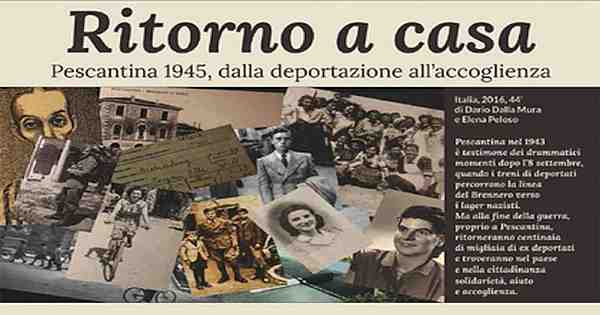
RITORNO A CASA - Pescantina 1945, dalla deportazione all’accoglienza
Pescantina nel 1943 è testimone dei drammatici momenti dopo l’8 settembre, quando i treni di deportati percorrono la linea del Brennero verso i lager nazisti. Ma alla fine della guerra, proprio a Pescantina, ritorneranno centinaia di migliaia e troveranno nel paese e nella cittadinanza solidarietà, aiuto e accoglienza. (44', Italia, 2016)
Following the dramatic moments of 8th September 1943, the town of Pescantina watched as trains of deported Italian troops and people headed north along the Brennero line towards the Nazi concentration camps. But at the end of the war, the people of Pescantina saw thereturn of hundreds of thousands of those deported, and gave them a warm welcome, offering help and solidarity. (44', Italy, 2016)


NOI, CITTADINI DEL MONDO
Volti e voci, storie e memorie di giovani immigrati che sono arrivati in Italia e che qui vivono. Nei loro racconti la nostalgia per i paesi lasciati, le difficoltà e le soddisfazioni nella scuola, nel mondo del lavoro e nella vita di tutti i giorni. Ma anche uno sguardo su come siamo e come potremmo essere in un futuro più condiviso. (55’, Italia, 2015)Faces and voices, stories and memories of young emigrates who came to Italy and who livehere. In their stories the homesickness for the countries they left,the hardships and the satisfactions in the schools, in the working world and in every day’s life. But also a glimpse into how we are andhow we could be in a more shared future. (55’, Italy, 2015)

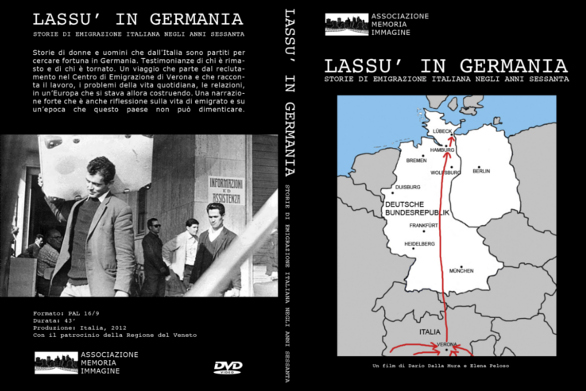
LASSU' IN GERMANIA - Storie di emigrazione italiana negli anni Sessanta
Storie di donne e uomini che dall'Italia sono partiti per cercare fortuna in Germania. Testimonianze di chi è rimasto e di chi è tornato. Un viaggio che parte dal reclutamento nel Centro di Emigrazione di Verona e che racconta il lavoro, i problemi della vita quotidiana, le relazioni, in un’Europa che si stava allora costruendo. Una narrazione forte che è anche riflessione sulla vita di emigrato e su un’epoca che questo paese non può dimenticare. (43', Italia, colore e B/N, 2012)Up There in Germany. Men and women who left Italy to seek their fortune in Germany tell their stories; some stayed, some returned home. The journey starts with recruitment in the Emigration Centre of Verona and describes the work,the problems of daily life and relationships in a Europe that was in the process of being built. A harsh story which reflects on emigrantlife and on an era which Italy should not forget. (43', Italy, colore e B/N, 2012)

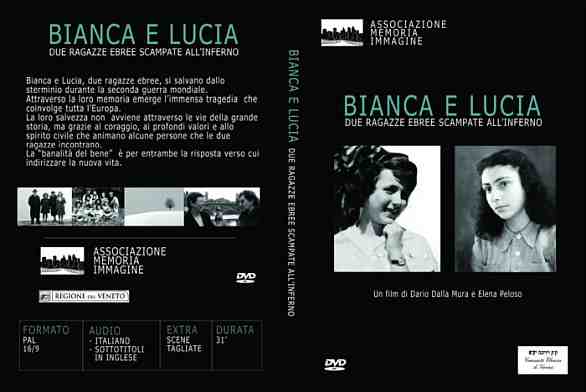
BIANCA E LUCIA - Due ragazze ebree scampate all’inferno
Bianca e Lucia, due ragazze ebree, si salvano dallo sterminio durante la seconda guerra mondiale. Attraverso la loro memoria emerge l'immensa tragedia che coinvolge tutta l'Europa. La loro salvezza non avviene attraverso le vie della grande storia, ma grazie al coraggio, ai profondi valori e allo spirito civile che animano alcune persone che le due ragazze incontrano. La banalità del bene è per entrambe la risposta verso cui indirizzare la nuova vita. (31', Italia, colore e B/N, 2010)Bianca and Lucia, two Jewish girls, were rescued from extermination during World War II. By means of their memories the great tragedy that involves the whole of Europe comes to the surface. Their rescue does not come via the roads of great history, but due to the courage, the deep values and the civil spirit that animate some of the people the two girls ecounter. The banality of goodness is for both ofthem the answer to which they'll address their new life. (31', Italy, colore e B/N, 2010)

L’Associazione Memoria Immagine, in collaborazione con la Fondazione San Zeno di Verona, ha curato la ristampa del romanzo Con i lupi alle spalle di Bianca Schlesinger.
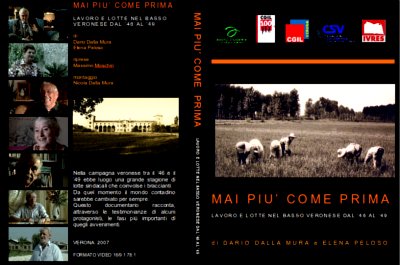
MAI PIÙ COME PRIMA - Lavoro e lotte nel basso veronese dal ’46 al ‘49
Nella campagna veronese tra il 1946 e il 1949 ebbe luogo una grande stagione di lotte sindacali che coinvolse i braccianti. Da quel momento il mondo contadino sarebbe cambiato per sempre. Questo documentario racconta, attraverso le testimonianze di alcuni protagonisti, le fasi più importanti di quegli avvenimenti. (67', Italy, colore e B/N, 2007)The period of Trade Union struggle which took place in the countryside around Verona between 1946 and 1949 also involved farmworker. From that moment on, life on the land changed for ever. This documentary, through first and account, narrates the most important phases of those events. (67', Italy, colore e B/N, 2007)

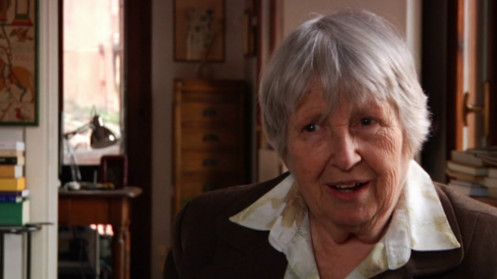
TESTIMONIANZA DI VERA JARACH
Vera Vigevani Jarach (Milano 1928) giovane ebrea è costretta a lasciare l’Italia e a rifugiarsi in Argentina nel 1939, in seguito alle leggi razziali. Si stabilisce a Buenos Aires e diventa giornalista dell’agenzia ANSA. Sua figlia Franca, attivista nel movimento di opposizione al regime, viene sequestrata nel 1976 e scompare. Da quel tragico evento comincia l’impegno di Vera di ricerca dei desaparecidos e di testimonianza, che la porta a essere un’esponente del movimento delle “Madri di Plaza de Mayo” e che dura tuttora. (41’, Italia, Colore, 2009)Vera Vigevani Jarach (Milan 1928) young Jewish woman is forced to leave Italy and seek refuge in Argentina in 1939, following the racial laws. She settled in Buenos Aires, where she married and became a journalist agency ANSA. Her daughter Franca, an activist in the movement of opposition to the regime, was kidnapped in 1976. Since that tragic event begins the engagement of Vera search of the desaparecidos and witness, which leads her to be an exponent of the movement of the "Mothers of Plaza de Mayo" and that is still ongoing. (41’, Italy, Colore, 2009)